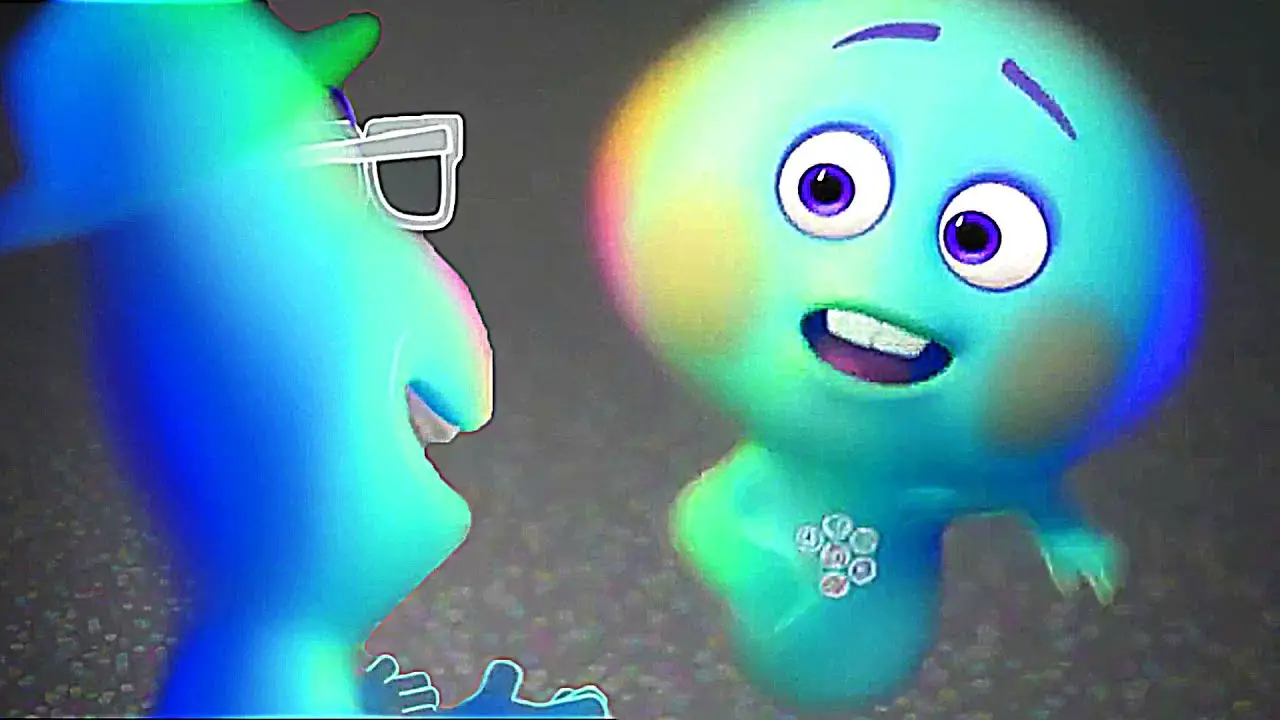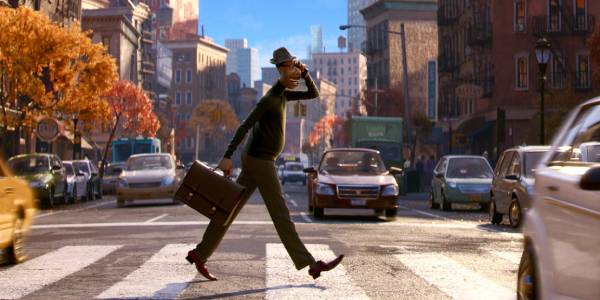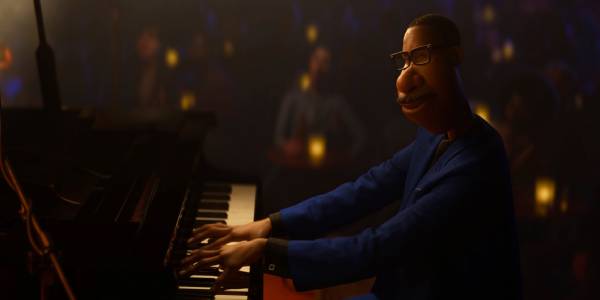London Film Festival 2020: SOUL

Former film student from Scotland turned writer and film reviewer.
There are arguably three different kinds of Pixar movies. There are the Exclusively-For-Kids movies (think Cars, The Good Dinosaur, A Bug’s Life), then there are the For-All-Ages movies (The Incredibles, Finding Nemo, recently released Onward), and finally, there are the ones that transcend age entirely and manage to break out of the traditional structures of the animated genre to do something completely different, such as Up, (the opening ten minutes of which carries more emotional resonance than most films can muster in 120 minutes), the original Toy Story and its 3rd outing (the less said about 2 and 4 the better), Coco, and, of course, Inside Out. The last of those arguably stands as Pixar’s most innovative, experimental film yet and is rightly heralded as a masterpiece.

Soul feels like it could be – and perhaps wants to be – a spiritual successor to Inside Out. Both are helmed by Pete Docter, whose obsession with the structures of unseen things (first explored in Monsters Inc.) continues here unabated. Both are imbued with philosophical ponderings (here it’s considering what the soul is, and how personality is formed), and both take some unusual, off-beat ideas and bring them to life. You would be forgiven for thinking that Soul is the next Inside Out, but sadly – and perhaps because of those lofty heights reached by the latter – Soul doesn’t quite ascend to that level, feeling a little at times like it tries too hard.
Joe and Jazz
Joe Gardner (voiced by Jamie Foxx) is a music teacher from New York. He is obsessed with jazz and, really, not much else. When we first meet him he’s teaching a group of uninspired children, most of whom would clearly rather be somewhere else; the drab greyness of the school’s surroundings seem to highlight Joe’s emotional state. He is bored and frustrated with a mediocre life that never amounted to much. That all changes when a former student offers him the opportunity to audition for the famous Dorothea Williams band. Joe is so excited about this opportunity to change his life that he doesn’t see the manhole he plunges straight through and into the afterlife.

He winds up in a celestial nursery called The Great Before, where souls go to be developed before being born on Earth. It’s a neat concept but patchily executed. Souls, it’s explained, need to find a “spark” before they’re able to start their lives. It’s the job of mentors to help guide these souls to their sparks so that they can begin their journey. Joe becomes a mentor to 22, a soul who’s been around for thousands of years and who has been (amusingly) mentored by everyone from Mahatma Gandhi and Mother Teresa to Abraham Lincoln and Muhammad Ali, and who has no interest in going to Earth. Joe figures if he helps 22 find her spark, he can take her place and go back home, and so begins an ostensible journey into the meaning of passion and the purpose of life.
The Heart of Soul
There are all the ingredients for a true Pixar classic here. An adventure to discover a philosophical meaning, an insightful, profound lesson to be learned, and tons of humor to be mined in its overarching concept. And for the most part, Soul does this beautifully. The character design is flawless, subtle nuances in expressions coming to mean so much more than they might in a lesser animation, and the contrast between a photorealistic New York (which has never felt more alive in an animation), and the trippy, abstract afterlife is a delight to see. Add to this a wonderful soundtrack which emphasizes its jazz roots in its earthbound scenes and a suitably ethereal score from Trent Reznor and Atticus Ross on the astral plane, and you’ve got one of the best looking – and sounding – Pixar films in years.
It’s a pity, then, that the rest of the film doesn’t quite stack up. It fails to render the same emotional journey of, say, Riley in Inside Out or Miguel in Coco. Joe, for the most part, is fairly arrogant and self-absorbed. This would be fine if his journey saw him learn how to be more humble and concerned for others, but that doesn’t seem to be the aim of Pixar here. Ostensibly the lesson to be learned is that you shouldn’t lose yourself in your ambitions. A beautiful sequence in a place called The Zone shows how becoming obsessed with success can be all-consuming and ruin your life. While this is absolutely an important lesson for Joe to learn, there’s an argument to be made that focusing on the inner lives of others (such as his hairdresser, whom he believes himself to be close with and then subsequently discovers he knows nothing about) would be more helpful in him becoming a better person.

This could be most impactful in his relationship with 22. Voiced by Tina Fey (who gives her a grating, disaffected tone), 22 is an aloof soul who has an understandably negative view of life on Earth. Joe’s attempts to persuade her otherwise are utterly half-hearted, so concerned is he with returning home. This relationship, you feel, is supposed to be the heart of Soul, but it jars so frequently and never really feels organic. It’s hard to buy into a burgeoning friendship between Joe and 22 when he’s so self-obsessed and she rarely concerns herself with what’s going on in the plot. Ultimately you feel they are never going to learn from each other because they so rarely listen to each other, even as the film reaches its climax.
A Paper-Thin Plot
Another, perhaps more obvious, issue is with the plot itself. Unusually for a Pixar film of this ilk, Soul‘s plot is paper-thin. We bounce around from Earth to the afterlife frequently, and the narrative changes enough times to make you feel like there were two or three different ideas for plotting that somehow got amalgamated into one. A second-act body swap subplot, for example, feels out-of-sorts with everything which preceded it and although this concept could be ripe for typical Pixar introspection, it barely even flirts with the idea. Instead, it is used as little more than a plot-device for Joe to connect with his mother, and then is dropped entirely in favor of a somewhat rushed third act.
None of this is to say Soul is not a good movie. When it’s at its best, Soul is wonderful. Its animation is spellbinding and innovative, the abstract counselors (of which Richard Ayoade, and Rachel House especially, are hilariously standout) are a fun and inspired addition, and the score is probably one of the best Pixar has done. Alongside this are moments of pure wonders, such as the aforementioned Zone (including a beautifully realized moment where Joe transcends the physical boundaries of corporeality while playing piano) and a played-to-perfection performance from Graham Norton (whose character, almost distractingly, is the spitting image of Paul Kaye, otherwise known as Thoros of Myr on Game of Thrones).
Conclusion
If there are three kinds of Pixar film, then Soul belongs in the lower echelons of the third kind. It does some truly outstanding things with its animation, its score is incredible, and there are a few moments of poignancy and beauty in amongst the shuffle. Ultimately it can’t sustain those moments in the same way as the likes of Inside Out, but it’s certainly worth investing time into; even a lesser Pixar film is among the greater animated efforts being made today.
Pixar has an extensive back catalog at this point. Which is your favorite? Let us know in the comments below!
Soul will be available on Disney+ on 25th December.
Watch Soul
Does content like this matter to you?
Become a Member and support film journalism. Unlock access to all of Film Inquiry`s great articles. Join a community of like-minded readers who are passionate about cinema - get access to our private members Network, give back to independent filmmakers, and more.













